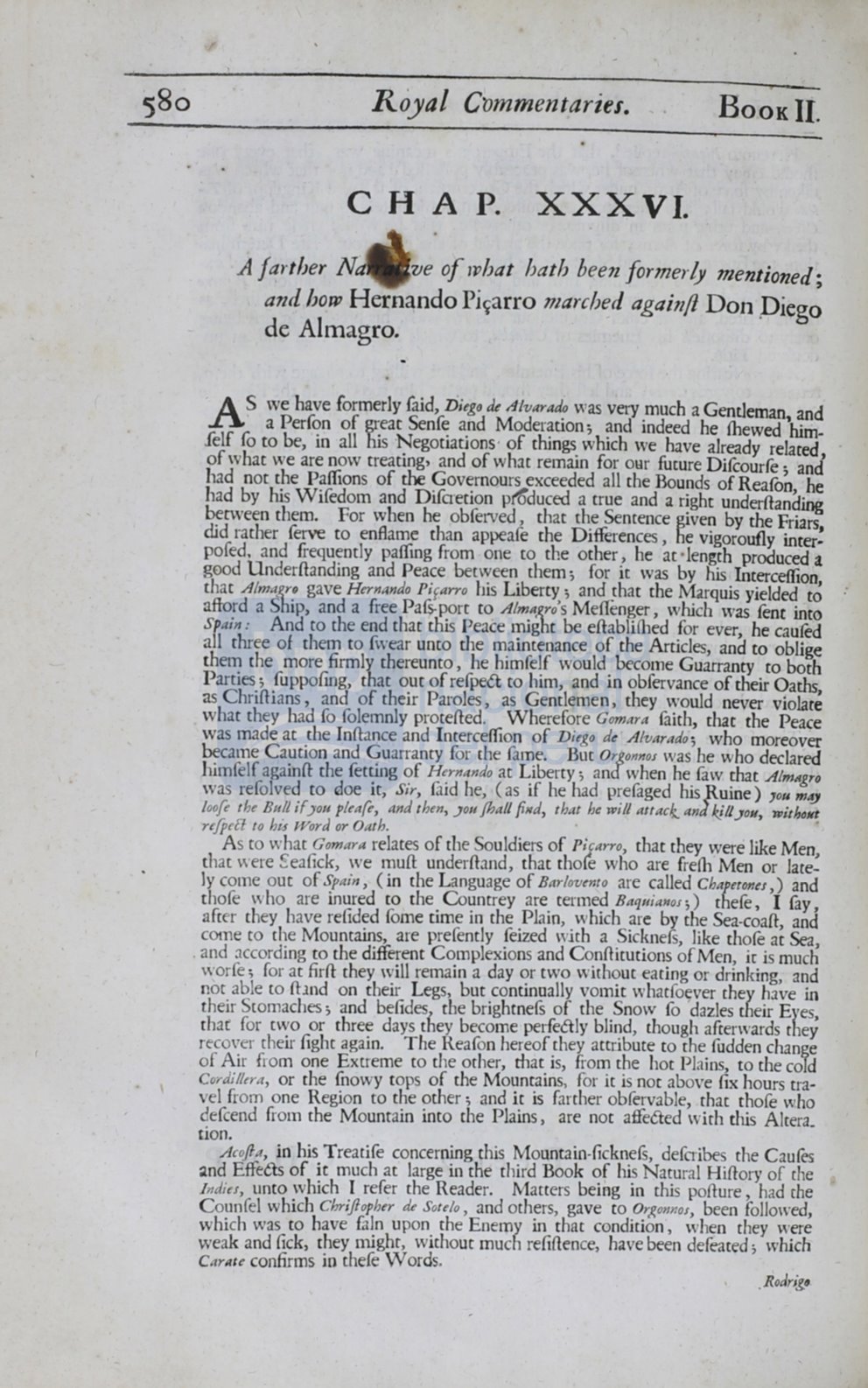

580
Royal
C{Jmmentaries.
BooKll
CH AP.
XXXVI.
A
fart
her
Na
ve
of
rvhat hath heen formerly mentioned;
and
how
Hernando
Pi~arro
11u1rched
againfl
Don
Piego
de Almagro.
'AS
we have formerly faid,
Diego
de
Alvarado
V\
as very much a Gentleman and
a Perfon of great Senfe and Moderation; and indeed he fhewed
'him–
felf
fo
to be,
in
all
his
·Negotiations · of things which we have already related
ofwhat we are now treating, and of
whar:
remain for mir future Difcourfe; and
had not the .Paffions of
the
Governours exceeded
all
the Bounds of Reafon
he
had by
his
Wifedom and Difa·erion
p~duced
a true and a right underfianding
between them. For when he obferved, that the Sentence given by
the Friars
did rather ferve to enflame than appeafe the Differences , he vigoroufly
inter!
pofed~
and frequently paifmg from one
to
the other, he at ·length produced
a
good Underfianding and Peace between them; for
it
was by
his
Interceffion
that
Alma_gro
gave
Hernando Pifarro
his
Liberty; and that the Marquis yielded
t~
a.Hord a )hip, and a free Pa{S:port to
Almagro's
Meifenger, which was fent into
Spain :
And to the end that this Peace might be ell:ablifhed
£
r
ever,
he caufed
all
three of chem to fivear unto the maintenance of the
Articles, and
to oblige
chem the more firmly thereunto, he himfelf would become Guarrancy to both
Parties; fuppofmg,
chat
out of refpeCl: to
him,
and in obfervance of their
Oaths
1
as Chriflians, and of their Paroles, as Gentlemen, they would never violare
what they had fo folemnly protell:ed. Wherefore
Gomara
faith,
that
the Peace
was made
at
the Infiance and Incerceffion of
Diego de A lvarado ;
who moreover
became Caution and Guarranry for the fame. But
Orgonnos
was he who declared
himfelf againCT: the fetting of
Hernando
at Liberty; ancf when he faw
that
Almttgro
' as refolved to
~oe
it,
Sir,
faid he,
(as
if
he had prefaged
his
.Ruine)
you
may
loofe
the Bull
if
you plea{e,
and
then,
JOH
fhall find,
that
he
will
attack._
and
kf:O
.JOH,
'¥PithoNt
refpcll to
hu
Word
or
Oath.
As to what
Gomara
relates of
the
ouldiers of
Picarro,
that they were
like
Men,
that \\ere .... eafick, we rnufr underfiand, that thole who are fre(b
Men
or
late–
ly come out of
Spain,
(in the Language of
Barlovento
are called
Chapetone1,)
and
thofe
Vt.
ho are inured co
the
Countrey are termed
Baquiano1;)
thefe,
I
fay,
aft r they have refided fome time in the Plain, which are by the Sea-coafi, and
come to the Mountains, are
refently feized \"dth a Sicknef5, like thofe at
Sea,
and according to the different Complexions and Confiitutions ofMen,
ir is
much
orfe; for at firfi they'
ill
remain
a
day or two without eating or drinking, and
not able to fhnd on their Legs, but continually vomit whatfoever they hJve
in
their
tamaches; and befides, the brightnefs of the Snow
fo
dazle their
Eyes,
thac: for two or three days they become perfectly blind, though afterwards they
r
cover their fight again. The Reafon hereof they attribute co the fudden change
of
Air
fiom one Extreme to the other,
that is,
from the hot Plains, to the cold
...ordillera,
or the fnowy tops of the Mountains, for it
i
not above fix hours tra-
el fl
om one Region to the other; and it is farther obfervable, that thofe who
defc end from the Mountain into che Plains, are not affetted wirh
this Alcera_
t:ion.
Acofta,
in his Treatife concerning this Mountain-ficknefs, defcribe
the Caufes
~nd
Effe& of
it
much at large
in
the third Book of h. Natural Hiftory of the
Indies,
unto \ hich I refer the Reader.
Matters
beiflg in this pofiure had the
ounfel which
Chriftopher
de
Sotelo,
and others, gave
co
OrJ!.onno1,
been followed,
which was to have faln upon the Enemy
in
chat condition,
\:
hen they were
weak and fick, chey might, without much refiilence, have been defeated; which
C11r11te
confirms in chefe Words.
.Roadgo














